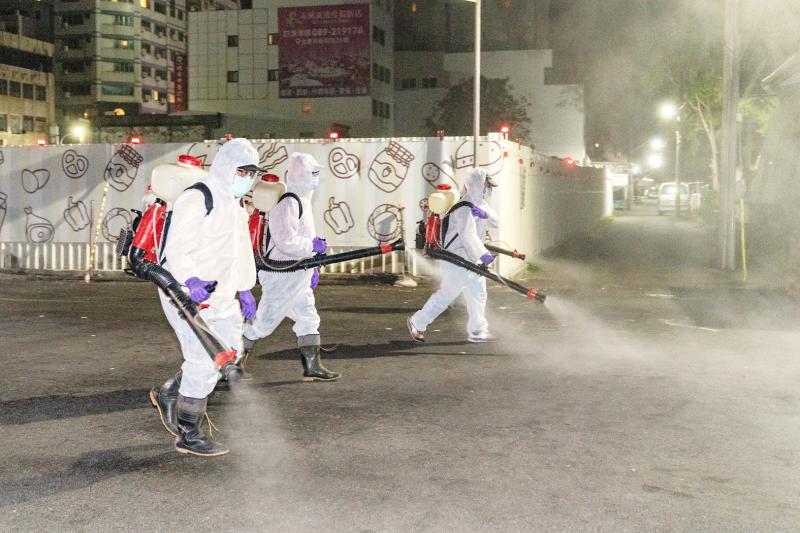Popular tourist spots and transportation hubs nationwide were disinfected yesterday to prevent a spike of COVID-19 cases following the Tomb Sweeping Day long weekend, the Environmental Protection Administration (EPA) said.
Environmental protection departments in cities and counties dispatched special squads, made up of 731 employees, who disinfected 863 locations, including 205 transportation hubs and 250 business areas, the EPA said.
These included popular tourist spots that the Central Epidemic Command Center (CECC) had cited in its text messages on Saturday, when it reminded the public to avoid crowded places and keep a proper social distance, including Kenting (墾丁) and Hengchun Old Street (恆春老街) in Pingtung County, Dongdamen Night Market (東大門夜市) in Hualien County and Guanzihling (關子嶺) in Tainan, it said.

Photo copied by Chen Hsien-yi, Taipei Times
The EPA reminded business owners that they should be following its disinfection guidelines and clean their indoor areas at least once per day, or more if their businesses get a lot of foot traffic.
The guidelines state that items that are frequently touched, such as service counters, tables and chairs, elevator buttons, escalator handrails, shopping carts, doorknobs, water taps, toilet seats and flush handles, diaper-changing tables and floor surfaces, should get special attention.
Minister of Health and Welfare Chen Shih-chung (陳時中), who heads the CECC, yesterday reminded the public to practice good personal hygiene and self-health monitoring following the long weekend.
The center said that it would be reviewing the crowds seen at some tourist spots over the holiday weekend to see if further crowd control measures should be imposed during the Workers’ Day long weekend from May 1 to May 3.
These could include designating more car-free zones to help widen the social distance space for pedestrians and limiting the number of guests that hotels could accept, it said.
Crowded areas were also on the mind of New Taipei City Mayor Hou You-yi (侯友宜) yesterday.
At a meeting about New Taipei City’s COVID-19 prevention measures, Hou said seeing scenic areas packed with holidaymakers had saddened him, as “all the hard work during the disease prevention period would mean nothing as long as there are loopholes.”
Local governments must be fully prepared to roll out more preventive measures, including tourist number controls, crowd diversion, and restrictions on hotel bookings, to perhaps 70 or 80 percent of their original thresholds.
Effective today, anyone not wearing mask would be barred from entering New Taipei City government buildings, including officials, Hou said.
Additional reporting by Chien Hui-ju and Lee I-chia

MORE VISITORS: The Tourism Administration said that it is seeing positive prospects in its efforts to expand the tourism market in North America and Europe Taiwan has been ranked as the cheapest place in the world to travel to this year, based on a list recommended by NerdWallet. The San Francisco-based personal finance company said that Taiwan topped the list of 16 nations it chose for budget travelers because US tourists do not need visas and travelers can easily have a good meal for less than US$10. A bus ride in Taipei costs just under US$0.50, while subway rides start at US$0.60, the firm said, adding that public transportation in Taiwan is easy to navigate. The firm also called Taiwan a “food lover’s paradise,” citing inexpensive breakfast stalls

TRADE: A mandatory declaration of origin for manufactured goods bound for the US is to take effect on May 7 to block China from exploiting Taiwan’s trade channels All products manufactured in Taiwan and exported to the US must include a signed declaration of origin starting on May 7, the Bureau of Foreign Trade announced yesterday. US President Donald Trump on April 2 imposed a 32 percent tariff on imports from Taiwan, but one week later announced a 90-day pause on its implementation. However, a universal 10 percent tariff was immediately applied to most imports from around the world. On April 12, the Trump administration further exempted computers, smartphones and semiconductors from the new tariffs. In response, President William Lai’s (賴清德) administration has introduced a series of countermeasures to support affected

CROSS-STRAIT: The vast majority of Taiwanese support maintaining the ‘status quo,’ while concern is rising about Beijing’s influence operations More than eight out of 10 Taiwanese reject Beijing’s “one country, two systems” framework for cross-strait relations, according to a survey released by the Mainland Affairs Council (MAC) on Thursday. The MAC’s latest quarterly survey found that 84.4 percent of respondents opposed Beijing’s “one country, two systems” formula for handling cross-strait relations — a figure consistent with past polling. Over the past three years, opposition to the framework has remained high, ranging from a low of 83.6 percent in April 2023 to a peak of 89.6 percent in April last year. In the most recent poll, 82.5 percent also rejected China’s

PLUGGING HOLES: The amendments would bring the legislation in line with systems found in other countries such as Japan and the US, Legislator Chen Kuan-ting said Democratic Progressive Party (DPP) Legislator Chen Kuan-ting (陳冠廷) has proposed amending national security legislation amid a spate of espionage cases. Potential gaps in security vetting procedures for personnel with access to sensitive information prompted him to propose the amendments, which would introduce changes to Article 14 of the Classified National Security Information Protection Act (國家機密保護法), Chen said yesterday. The proposal, which aims to enhance interagency vetting procedures and reduce the risk of classified information leaks, would establish a comprehensive security clearance system in Taiwan, he said. The amendment would require character and loyalty checks for civil servants and intelligence personnel prior to